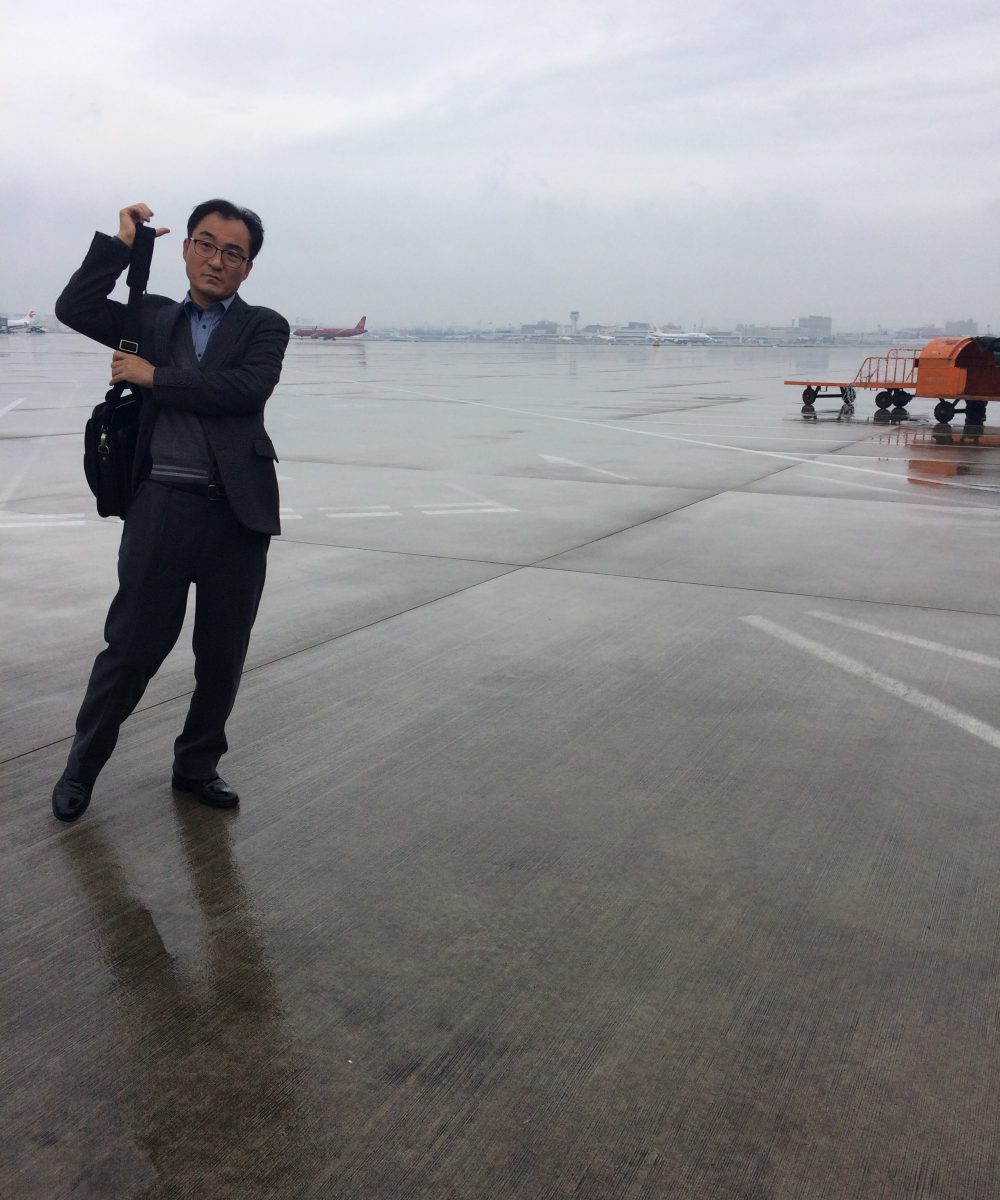11th Shanghai Biennale, ‘Why Not Ask Again?’ Arguments, Counter-arguments and Stories, Power Station of Art, Shanghai, China,12 November 2016 – 12 March 2017
Originally published at This is Tomorrow, 3 February 2017
Alex Hetherington’s research trip to Shanghai was funded by an Open Project award from Creative Scotland. Image taken on the runway at Shanghai Hongqiao International Airport 21 December 2016, photo Alex Hetherington
The 11th Shanghai Biennale, curated by New Delhi-based Raqs Media Collective and housed in a former power station, is a dense and vastly scaled staging that melds Chinese science fiction, Bengali parables, the principles of traditional South Asian miniature painting, turbulent shifts in political thought and a scrutiny of the transportation of mass information through technologies, screens and devices. Allowing each to reveal, expose, recode and eavesdrop upon their incongruities and interconnectedness.
Throughout their work the Collective have presented themselves through a plurality of roles: artists in video and high tech installation that mediate on the human experiences of globalisation’s industrial forms and social factories. At times as curators and philosophical agents through large-scale presentations that ‘interrupt, leaven and relay resonant and dissonant lines of enquiry’. Their name Raqs, a term meant to describe a visionary state induced by whirling dervishes, is engaged as a contradictory conceptual approach – simultaneously kinetic, delirious and contemplative. This approach finds root in discordant literary reference and the foundation points to their Biennale, which asks ‘How do Questions Act in the World?’ and how are questions ‘transported now’ between analysis and answer, is Chinese novelist Liu Cixin 2008 science-fiction ‘The Three Body Problem’ and ‘Jukyi Takko aar Gappo’ (Reason, Debate and a Story) by Bengali cinema director Ritwik Ghatak, from 1974.
Cixin’s novel is set on a planet of environmental extremes caused by the unpredictable and often times violent gravitational trajectories of the twin suns it orbits around. Existing precariously between stages of stability and chaos, the planet’s inhabitants have witnessed the abrupt termination of other neighbouring civilisations. The book’s preliminary passages recounts how a scientist operating during the Chinese Cultural Revolution in the 1970s finds a way to transmit a signal, and a plea for help and the guidelines for survival, from earth to this intense future landscape. Ghatak’s film meanwhile draws up the story of an aged, alcoholic intellectual recounting stories from his life, through intoxication and failing memories, to a variety of allegorical and politically framed characters, purposing a story on collective remembering and fractured histories and narratives. The film’s central protagonist, his name Nilkantha refers to Shiva, who drank poison from the oceans to prevent it from destroying the beauty of the world.
The braiding of these illustratory texts sets the stage for a layering of comparative inquiry described as a ‘bringing together of reasoning and intuition and the fabulous’. Meanwhile the explanatory language of the Biennale’s curatorial premises through masses of publications, wall texts and documentary video is in constant motion, open, permeable, meandering and – at times – is pure obfuscation. Strange questions are everywhere: ‘What dances when forces gather and disperse?’; ‘Is it necessary to find the axes of illegible orbits?; ‘How chromatic is the fragility of spectrums?’ In these confusing cross-examinations an attempt is made to present historical, cultural, philosophical or political ghosts gesturing to a haphazard now and potential, conflicting futures.
The title of ‘Why Not Ask Again?’ is broken down further to four sub-headings: Terminals, the Infra-Curatorial, Theory Opera and 51 Personae, each allowing clusters of work to phrase or give expression or define these ambiguous terms. The best of which within its roster over 100 artists is the Biennale’s selections and presentation of film and moving image. Within these video projections, filmed performances and monitors answers to ‘Why Not Ask Again?’ form around artists giving space and time to subjects of learning, the importance of disguise, revelations and confessions that that reveal the edges of perception, hallucination and consciousness, human matter and material sequenced into industrial processes, and the potential of technologies that allow scale and detail, vastness alongside minutiae, to be explored in discordant and imaginative ways: Ritwik Ghatak’s source film is reimagined in Moinak Biswas’ video ‘Across the Burning Track’, placing the drunken protagonist exuberant for the challenges of modern day Shanghai; Marjolijn Dijkman’s ‘Lunar Station’ connects the passage of time with poetic observations on the technological mapping of an asteroid; Yang Zhenzhong’s slow-motion video ‘Disguise’ shows factory workers wearing masks that dramatize the mundane gestures of manufacturing; Bianca Baldi’s video ‘Zero Latitude’ presents the assembly of a portable bed produced by Louis Vuitton for the colonialist explorer Savorgnan de Brazza; Yazan Khalili’s video Robbery in Area A restages a bank robbery in Ramallah, a city already infused with a sense of urgency; Tao Hui’s Joint Images sees actors recreate scenes from TV as though they were live encounters while in her Talk About Body she scripts an anthropological analysis of her appearance dressed in Muslim attire; Sohrab Hura’s Sweet Life is a journal describing a need to experience things which are about to disappear; and Surabhi Sharma and Tejaswini Niranjana’s five-screen video installation Riyaaz depicts a group of people learning to read and understand music. In these screens the artists capture a group of people in thought and reflection, in a place of appearance while the conscious mind is held elsewhere, and surrounding them, the rapid to-and-fro of a city in giddy motion. This project serves to achieve the Biennale’s purpose: to claim a state of reflection, balance or mind expansion at the interchange of rapidly shifting itineraries and perspectives.
